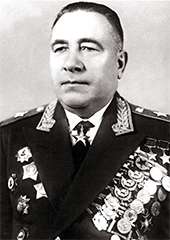Mikhail Katukov
| Mikhail Katukov | |
|---|---|
 | |
| Born |
17 September 1900 Bolshoe Uvarovo, (now Moscow Oblast) |
| Died |
8 June 1976 (aged 75) Moscow |
| Allegiance | Soviet Union |
| Years of service | 1919–1963 |
| Rank | Marshal of the armored troops |
| Unit | Armoured Troops |
| Commands held | |
| Battles/wars | |
| Awards | |
| Other work |
Commander of Armored Forces of the Group of Soviet Forces in Germany Inspector General of the Army |
Marshal of Armoured Troops Mikhail Efimovich Katukov (17 September 1900 – 8 June 1976) (Russian: Михаи́л Ефи́мович Катуко́в) served as a commander of armored troops in the Red Army during and following World War II. He is viewed as one of the most talented Soviet armor commanders.[1] His most notable command during the German-Soviet War was that of 1st Guards Tank Army which he commanded during the Battle of Kursk, Operation Bagration, the Vistula Oder Operation, and the Battle of Berlin. He also commanded 1st Guards Tank Brigade during the Battle of Moscow, and 3rd Mechanised Corps[2] during Operation Mars.
Early life
Katukov was born on 17 September 1900 in the village of Bolshoe Uvarovo in Kolomensky Uyezd, Moscow Governorate, now in the Ozyory Urban Okrug of Moscow Oblast, to an impoverished peasant family of five children. From a young age he worked on the local landowner's dairy farm. Katukov graduated from the primary rural school. In 1912 he was sent to relatives in Saint Petersburg, where he worked as a messenger boy in a dairy shop, and later in the factories of the city. Katukov participated in the October Revolution in 1917, after which he returned to Bolshoe Uvaravo to take care of his family after his mother's death.[3]
Military career
Katukov entered the Red Army as a private in 1919. He served during the Russian Civil War, and later served as a tank formation commander before the war. In 1935 he graduated from the Stalin Military Academy and in July 1936 he was promoted to captain. In October 1938 came his first major command as acting commanding officer of the 5th Light Tank Brigade of the 45th Mechanized Corps. He survived the purges.
The Great Patriotic War
On the onset of the war he took command of the 4th Tank Brigade. In the battle of Moscow in 1941, it was Katukov's Tank Brigade, then part of the 1st Guards Rifle Corps, that checked the advance of Guderian's Panzergruppe 2 near Tula. To honor this achievement it became the 1st Guards Tank Brigade.
Later during Operation Mars in December 1942, Katukov's command managed a deep penetration into the German lines in the Rhzev salient.
In January 1943 he took command of the 1st Guards Tank Army, a post he held for the duration of the war.
In the battle of Kursk, Katukov's command was one of the two armies that were hardest-hit by the initial German advance on the southern shoulder. Through the use of well-defended and sited strong-points, dug in tanks, and judicious use of counterattacks, Katukov managed to extract a high toll from the German attackers breaking through the defensive system.
He commanded his tank army in the Lvov–Sandomierz Offensive, the Vistula–Oder Offensive, and the Battle of Berlin.
Mikhail Katukov was awarded the title of the Hero of the Soviet Union twice (September 29, 1944 and April 6, 1945).[3]
Post-War
Following the war he became commander of the mechanized forces of the Group of Soviet Forces in Germany, and later Inspector General of the Army.
In popular culture
In the 1970 film Patton, Katukov is portrayed drinking a toast with General Patton to celebrate their armies' mutual victory over Nazi Germany.
Honours and awards
- Soviet Union
- Foreign
| Patriotic Order of Merit, in gold (East Germany) | |
| Cross of Grunwald, 2nd class (Poland) | |
| Knights Cross of the Virtuti Militari (Poland) | |
| Commander's Cross of the Polonia Restituta, (Poland) | |
| Medal "For Warsaw 1939–1945" (Poland) | |
| Medal "For Oder, Neisse and the Baltic" (Poland) | |
| Distinguished Service Order (United Kingdom) | |
| Order of Sukhbaatar (Mongolia) | |
| Order of the Red Banner (Mongolia) | |
| Order "For Service in Battle" (Mongolian People's Republic) | |
Sources and references
- ↑ David Glantz, Jonathan House, The Battle of Kursk, University Press of Kansas, 1999 P62
- ↑ David Glantz, Zhukov's Greatest Defeat – The Red Army's Epic Disaster in Operation Mars 1942, University Press of Kansas, 1998 P140
- 1 2 "Mikhail Katukov". warheroes.ru (in Russian).